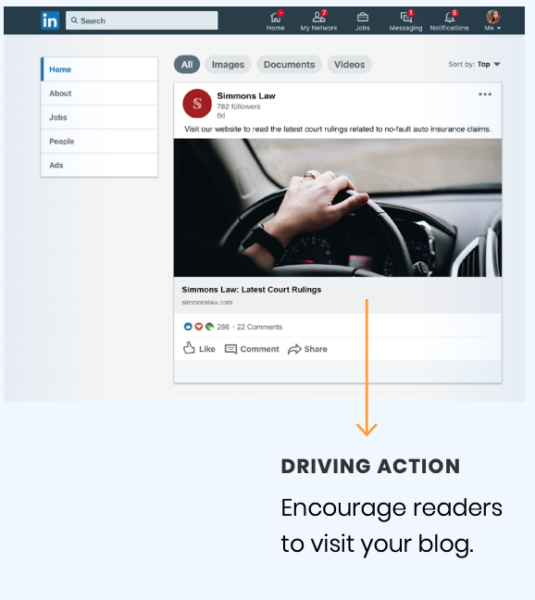To keep your practice healthy, you need a steady stream of incoming clients. That means consistently getting the word out there about your practice, but no lawyer has endless hours to devote to marketing.

Wouldn’t it be nice if you could take the time you do have, and invest it in a strategy with proven results?
Get new clients and drive referrals with marketing tools and advice for legal professionals.
Here’s some good news — 35 percent of lawyers who use social media report getting clients from it. Don’t have a huge marketing budget? No problem. Results are even better for smaller firms with less than 10 lawyers. No matter what size your firm is or what kind of law you practice, social media can help you grow.
This article will help you understand the ins and outs of social media for lawyers, including why it matters and what platform you should start with. Plus, by the time you finish reading, you’ll have actionable social media tactics you can use right away.
Why is social media important for lawyers?
It connects firms with clients. No matter where you work or what practice areas you work in, there’s an ongoing need for new clients. In fact, when Thomson Reuters asked lawyers in small firms to rate their most significant challenges, new client acquisition topped the list.
It’s budget-friendly marketing. The ABA reports that less than a third of firms with two to nine lawyers have marketing budgets, and the number drops to 17 percent for solo practitioners.
Social media doesn’t require a budget. It’s possible to post, share, and generate conversations at no cost to your firm.
It’s where your audience spends their time. According to Pew Research, 72 percent of American adults use at least one social platform, and adoption is increasing across all age groups. You can’t beat that kind of reach.
It’s where your competitors are. As of 2019, 80 percent of attorneys use social media as part of their marketing strategy. These days, being competitive means being on social.
It establishes thought leadership. Social media gives you the opportunity to share your expertise and insights and to dialogue with people in the comments section.
Which platform is best for you?
Social media marketing works best with a consistent approach. Reserve your business name on the biggest channels — Facebook, LinkedIn, Twitter, and Instagram — but choose one to focus your attention.
When it comes to social media for lawyers, LinkedIn leads the pack. The American Bar Association (ABA) reports that 79 percent of firms on social media use LinkedIn. Facebook comes in second at 54 percent. Which one is best for you depends on who your clients are and what you want to communicate.
LinkedIn is best for hosting professional conversations. If you represent businesses or individuals’ business interests, starting with LinkedIn is a no-brainer. It’s also a great place to share more in-depth material related to your firm and practice areas. People on LinkedIn tend to be in a work-related frame of mind, so you can afford to be more in-depth here than on other channels.

Facebook also lets you showcase your thought leadership. It may be less popular among lawyers, but among the general population, it’s still the most widely used platform. It’s a great way to build relationships and maintain a presence so that when people need a lawyer, they think of you.
How to engage with audiences on social media
Social media is all about relationships. As you build your social media strategy, which the following paragraphs will help you to do, think about how each tactic will help you to connect with current and future clients.
Tell your brand story
Humans are hard-wired for narrative. When we hear a story, we immediately put ourselves in the main character’s position. As a lawyer, you can create those kinds of connections by sharing your story through your social media channel.
The first step is to make sure your profile is complete and includes a sound byte of your firm’s narrative. This can be something as simple as:
Since 1989, we’ve helped people to navigate the rough legal waters of divorce.
It’s specific, it tells what you do in story form, and it paints a vivid picture.
You can use your social posts to expand and flesh out that firm story. For example, you might:
- Post a short professional bio featuring you and/or other attorneys in your practice.
- Share accomplishments and achievements like “Best Lawyers” mentions and, if appropriate, big wins.
- Run a “Throwback Thursday” series with pictures from law school or stories about how you passed the bar.
- Jump on the AMA (“ask me anything”) trend — perhaps with a legal disclaimer of confidentiality — inviting people to ask questions about your practice, the kind of law you practice, and similar topics.
Remember that even though it’s your story, you’re still on social media. Respond to questions and thank people for expressions of good wishes, congratulations, and so on.
Interact with your audience
Engagement is the key to a successful social media strategy. Take Facebook, for example. Its algorithm explicitly prioritizes posts that “spark conversations and meaningful interactions,” and it’s up to you to make that happen on your page.
To start, make sure that your social media routine includes checking your page and messenger for questions. Turn on notifications if it helps you avoid missing anything.
Next, make a point of responding to comments and questions as appropriate. Naturally, you won’t give any legal advice over social media, but you can ask posters to contact you directly. For efficiency’s sake, come up with a friendly yet professional response to legal questions, like:
I can’t give advice over social media, but I want to help!
Tell people how they can find you, whether that means linking to your website or inviting them to send you a message.
Let people message you through social media if you can. According to Marketing Chart, almost three-quarters of people who follow brands on social media prefer to reach out in-platform with questions or requests for support.
Talk about what’s new
You have your website and attorney profiles to share information that’s never going to change. Social media is for the here and now — in other words, for inspiring confidence that you keep up with the latest in your field.
If there’s something going on in your firm, your practice area, or law in general, social media is a great place to start a conversation about it. Remember to craft your posts in a way that invites conversation. For example:
- Today we launched our newly redesigned website. What do you notice that’s different?
- Our state just introduced a stiffer penalty for minors convicted of driving under the influence. What are your thoughts?
- Today, Congress meets to decide on {issue}. What do you predict will happen?
Share blog posts
If there’s one way to stay accountable with up-to-date, relevant content, it’s with a blog.
Blogs are marketing powerhouses for today’s attorneys. They let you showcase your expertise without coming across as “sales-y,” and when you host them on your website, they help your practice stand out to search engine crawlers.
Social media is the perfect enhancement to your content strategy. It lets you share your posts with a wider audience, and it provides an opportunity to link back to your main site.

To maximize engagement with your blog content, make sure to:
- Write about issues that are immediately relevant to your audience.
- Link to your other blog posts and/or website pages so people can learn more.
- Caption your social media shares with a quote that will make people want to learn more.
- At the end of the post and in your social media caption, invite people to share the post if they found it helpful.
Run targeted ads
Social media ads round out a complete strategy. You have to pay to run them, of course, but they’re cost-efficient because they let you reach a specific audience. For example, if you build a Facebook ad as a small business lawyer, you could tell Facebook to show your ad to entrepreneurs living in a particular area or working in a particular industry.
Launching your social media strategy
Now that you know the importance of social media for lawyers, what platforms are available to you, and what kinds of posts work best for engaging clients, you’re ready to start posting!
Remember, you don’t have to try every strategy right away, nor should you. Read over the strategies you learned about in this article, and choose one that compliments your current marketing plan. And if you’d like to know the role that social media plays in a complete online marketing plan, read The Download specifically for professional services.
Social media is all about creating connections. Be real and offer useful information and resources, and you’re bound to succeed.




